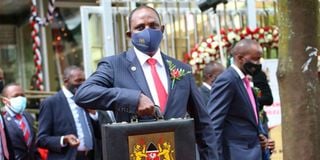Breaking News: Former Lugari MP Cyrus Jirongo dies in a road crash
Premium
National Treasury faulted for flouting budget process

Treasury Cabinet Secretary Ukur Yatani displays the budget briefcase on June 10, 2021.
What you need to know:
- National Assembly says Division of Revenue Bill, 2022, has to be legislated first.
- CS Ukur Yatani had planned to unveil the budget highlights in the House on April 7.
MPs have faulted the National Treasury for violating due process as it prepares a Sh3.33 trillion budget for the 2022/23 financial year.
The National Assembly said the government’s revenue generation proposals can only be undertaken once the Division of Revenue Bill (DoRB), 2022, has been legislated.
National Treasury Cabinet Secretary Ukur Yatani had planned to unveil the budget highlights in the House on April 7.
But in a letter to Treasury Principal Secretary Julius Muia, the House Business Committee has directed Mr Yatani to follow due process. The HBC, chaired by Speaker Justin Muturi, prioritises the business to be transacted.
“The committee asked that you be notified that the consideration of budget estimates are to be preceded by the passage of the annual Division of Revenue Bill by both Houses of Parliament,” states the letter signed by Ms Serah Kioko for the Clerk.
“In the meantime, it may be advisable to the National Treasury to seek expedited processing of the DoRB with the Senate.”
The revenue Bill allocates funds between the national and the 47 county governments equitably. This means until it is enacted, the national government does not know what it has been allocated and cannot, therefore, proceed to budget what it does not have.
The Bill contains a total shareable revenue of Sh2.14 trillion between the national and the 47 county governments for the 2022/23 financial year. Of this, Sh1.76 trillion has been allocated to the national government, the counties equitable share of Sh370 billion and Sh7.06 billion in equalisation fund.
Tabling of budget estimates
The budget is traditionally tabled in the second week of June, but because this is an election year, the National Treasury is required to start the process early.
The National Assembly must approve it before adjourning sine die – without setting the date for the next meeting – to allow members time to campaign.
MPs are set to break for recess between April 14 and May 10. The revenue Bill is currently in the Senate for concurrence, having been passed by the National Assembly on March 3.
The position of the National Assembly is augmented by the High Court ruling in 2019 that DoRB must be approved by Parliament before the budget estimates are tabled.
The court advised Parliament to make the necessary changes to the Public Finance Management (PFM) Act to comply with the judgment. This led to amendments of sections 39 and 40 of the PFM Act, which presupposes the presentation of the budget policy highlights and the annual Finance Bill after submission of the estimates.
Mr Muturi made it clear last Wednesday that until the Senate clears the Bill, the CS would not be allowed to present the highlights and revenue-raising measures.
“There is that looming danger that includes allowing him (Mr Yatani) to set his foot in Parliament to present the budget before the DoRB has become law,” the Speaker warned after an intervention from Garissa Township MP Aden Duale.
Mr Muturi said the issues Mr Duale had raised had already been tackled by the HBC.
Public debt monster
“We will wait since it is the right of the other House to tinker with the DoRB and that will pave the way for a mediation process.”
Mr Duale had sought the guidance of the Speaker on whether Mr Yatani had violated the Constitution by publishing the date for the budget statement.
“The business of this House for any particular day is decided upon by the HBC and not by the Executive. Therefore, the indication by the National Treasury CS on when he will be presenting the budget statement to this House is a potential interference on the calendar, business and proceedings of this House,” argued the Garissa Township MP.
The PFM Act provides that once the National Assembly has approved the Budget Policy Statement (BPS) with or without amendments, the next step is preparation, tabling and approval of DoRB and the County Allocation of Revenue Bill (CARB).
After this is done, the budget estimates can be tabled, considered, and approved via a House resolution through the Committee of Supply. This is the only time the House can allow the CS to make policy pronouncements and revenue raising measures in the form of a budget statement.
Given that the Senate has yet to consider the revenue Bill, there is a likelihood of variation in the proposed equitable share for the devolved governments.
Mr Duale reminded the House that the public debt monster was a key concern during the consideration of the BPS.
In approving the BPS, the House resolved that a legislative instrument on the debt ceiling be presented to the House for consideration and approval before tabling the budget estimates. So far, the Treasury has yet to table such an instrument, which is a violation of the House resolution.





